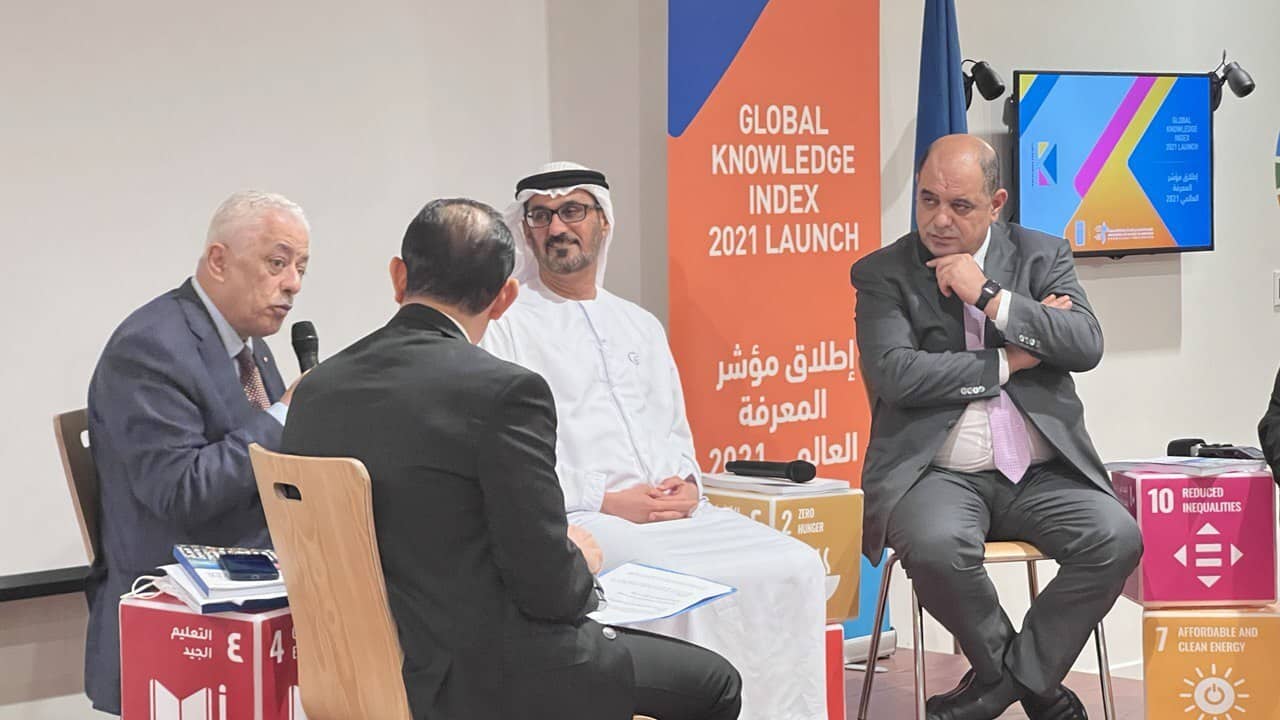The UAE was ranked 11th globally and first in the Arab World in the Global Knowledge Index (GKI), which measures knowledge globally in key areas including education, innovation, and ICT.
In this year’s edition, the knowledge index included 155 variables, selected by more than 40 international sources and data bases.
The event was held under the patronage of Sheikha Latifa bint Mohammed bin Rashid Al Maktoum, Chairperson of the Dubai Culture & Arts Authority (Dubai Culture), the United Nations Development Programme (UNDP) and the Mohammed bin Rashid Al Maktoum Knowledge Foundation (MBRF).
Switzerland stood first globally for the fifth year in a row as the rankings for Global Knowledge Index leaders was unveiled for 2021.
The GKI global leaders from other countries list up to the 100th position included Qatar at the 38th place, Kingdom of Saudi Arabia at 40, Kuwait (48), Oman (52), Egypt (53), Bahrain (55), Tunisia (83) and Lebanon (92). Morocco was at 101 globally, followed by Jordan (103), Algeria (111), Iraq (137), Sudan (145), Mauritania (147) and Yemen (150).
The fifth edition of the GKI aims to measure knowledge globally as a comprehensive closely connected with sustainable development and with different dimensions of modern human life.
Sweden ranked second on the index, followed by the US, Finland, and the Netherlands.
“The world is not completely out of the grip of COVID-19, but without doubt what stands out as we negotiated these trying times, is the relentless quest for knowledge that led us to develop vaccines as well as remedial and precautionary measures against the virus. Obviously, this continuing focus on knowledge and its triumph is what has led us to bring back careful normalcy in our daily life, and what has enabled this face-to-face meeting today,” said CEO of MBRF, Jamal bin Huwaireb.
Globally, the country level of participation at GKI 2021 was at 154, in comparison with last year’s participation of 138.
“When the word stands at these challenging cross roads, the increased global participation at GKI is a robust indicator of how knowledge is the single most factor that will help world nations prosper and lead in front for the benefit of posterity with sustainable focus. In this context, the GKI series has developed into an accepted and prudent benchmark in assessing knowledge-based societies and their growth,” said Dena Assaf of the UN.
“It is encouraging to see that in certain key branch indexes that drive knowledge, innovation and education, Arab countries have been faring well and is firmly on the road to progress. Significantly, it shows the positive impact of the awareness that the new world is largely shaped and led by countries that have an edge in knowledge,” said Khaled Abdel-Shafi, Regional Hub Manager of UNDP, RBAS.
The launch ceremony was followed by a ministerial panel on `Rethinking Policymaking in the Age of Knowledge,’ participated by Hussain Al Hammadi-Minister of Education, Dr. Tarek Shawki – Egyopt’s Minister of Education, Ahmed Hanandeh – Jordan’s Minister of Digital Economy and Entrepreneurship, Dr. Fadia Kiwan – Director General of Arab Women Organization, and moderated by Dr. Hany Torky – Manager of Knowledge Project, UNDP RBAS.
The average rate of global performance at GKI 2021 stood at 48.4 percent and the best performance was for pre-university education at 60.8 percent, followed by environment (55.3), economy (52.9), technical learning and professional training (51.2), higher education (46.1), ICT (43.3) and research and development and innovation (31.4).
A partnership between UNDP-RBAS and MBRF presents GKI on year basis since 2017. The GKI includes 155 variables in total, selected from 40 sources including the UNESCO, World Bank, ITU, International Monetary Fund, Organization for Economic Cooperation and Development, International Labor Organization etc.
“Over the years the Knowledge Project and GKI have been able to facilitate a strategic and forward-looking policy push among countries and decision makers to give more weightage to knowledge-centric development. This shift in developmental vision is imperative in times when sustainability has also become a core issue that needs to be addressed with alacrity, and the institution of GKI has added immense value to this context,” said UNDP’s Manager of Knowledge Project, Dr. Hany Torky.








